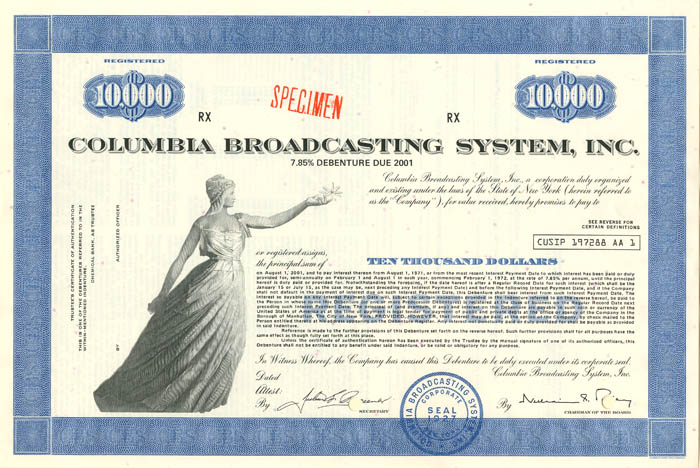Columbia Broadcasting System, Inc. - Bond
Inv# ET1070 Bond
Blue $10,000, Green $5,000, Orange $1,000 or Red no denomination Specimen Bond printed by American Bank Note Company. Please specify color.
CBS (Columbia Broadcasting System) is an American commercial broadcast television and radio network owned by ViacomCBS through its CBS Entertainment Group division. The network is headquartered at the CBS Building in New York City, with major production facilities and operations in New York City (at the CBS Broadcast Center) and Los Angeles (at CBS Television City and the CBS Studio Center).
The name "CBS" is an initialism of its former legal name that was used from 1928 to 1974, Columbia Broadcasting System. CBS is also sometimes referred to as the Eye Network, in reference to the company's trademark symbol, in use since 1951. It has also been called the "Tiffany Network", alluding to the perceived high quality of its programming during the tenure of William S. Paley. It can also refer to some of CBS's first demonstrations of color television, which were held in the former Tiffany and Company Building in New York City in 1950.
The network has its origins in United Independent Broadcasters Inc., a radio network founded in Chicago by New York City talent agent Arthur Judson in January 1927. In April of that year, the Columbia Phonograph Company, parent of the Columbia record label, invested in the network, resulting in its rebranding as the Columbia Phonographic Broadcasting System (CPBS). In early 1928, Judson and Columbia sold the network to Isaac and Leon Levy, two brothers who owned WCAU, the network's Philadelphia affiliate, as well as their partner Jerome Louchheim. They installed Paley, an in-law of the Levys, as president of the network. With the Columbia record label out of ownership, Paley rebranded the network as the Columbia Broadcasting System. Under Paley's guidance, CBS would first become one of the largest radio networks in the United States, and eventually one of the Big Three American broadcast television networks. In 1974, CBS dropped its original full name and became known simply as CBS, Inc. The Westinghouse Electric Corporation acquired the network in 1995, renaming its corporate entity CBS Broadcasting, Inc. two years later, and eventually adopted the name of the company it had acquired to become CBS Corporation. In 2000, CBS came under the control of the original incarnation of Viacom, which was formed as a spin-off of CBS in 1971. In 2005, Viacom split itself into two separate companies and re-established CBS Corporation through the spin-off of its broadcast television, radio and select cable television and non-broadcasting assets, with the CBS network at its core. CBS Corporation was controlled by Sumner Redstone through National Amusements, which also controlled the second incarnation of Viacom until December 4, 2019, when the two separated companies agreed to re-merge to become ViacomCBS. Following the sale, CBS and its other broadcasting and entertainment assets were reorganized into a new division, CBS Entertainment Group.
CBS operated the CBS Radio network until 2017, when it sold its radio division to Entercom. Before this, CBS Radio mainly provided news and features content for its portfolio of owned-and-operated radio stations in large and mid-sized markets, as well as its affiliated radio stations in various other markets. While CBS Corporation shareholders own a 72% stake in Entercom, CBS no longer owns or operates any radio stations directly; however, it still provides radio news broadcasts to its radio affiliates and to the new owners of its former radio stations, and licenses the rights to use CBS trademarks under a long-term contract. The television network has over 240 owned-and-operated and affiliated television stations throughout the United States, some also available in Canada via pay-television providers or in border areas over-the-air. CBS was ranked 197th on the 2018 Fortune 500 of the largest American corporations by revenue.
A bond is a document of title for a loan. Bonds are issued, not only by businesses, but also by national, state or city governments, or other public bodies, or sometimes by individuals. Bonds are a loan to the company or other body. They are normally repayable within a stated period of time. Bonds earn interest at a fixed rate, which must usually be paid by the undertaking regardless of its financial results. A bondholder is a creditor of the undertaking.











Ebay ID: labarre_galleries